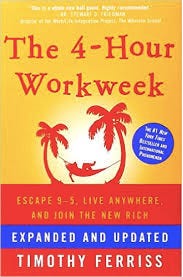https://tim.blog/tim-ferriss-books/#the-4-hour-workweek
“Someday” is a disease that will take your dreams to the grave with you.”- Tim Ferriss on the importance of seizing the present moment.
Why
Do you ever find yourself leaning back in your chair at work with outstretched arms as you stare at the clock for the 5th time in the past 10 minutes, questioning whether or not its hands are actually moving? Maybe it’s around 4:00 PM on a Friday, and all you can think about is escaping your gloomy office desk, so you can finally get to the party, the big game, or the vacation that you’ve been thinking about all week. In times like these, you might ask yourself, “Why am I here again?” If this scenario is at all familiar to you, it appears that you are not alone, as according to this article, 80% of Americans in 2019 were not happy with their jobs. So what are we doing working jobs that we don’t like, spending time on projects that don’t fuel our drives, and missing out on the people, places, and things that we are passionate about? When it comes down to it, I think that most people in the 1st world would say that they would not be doing these things if they didn’t have to, but that time, money, and resources are confining them to their unsatisfied work situation. Whether it be traveling, starting a business, enjoying time with loved ones, or pursuing hobbies, I have noticed my own family and friends sacrificing their ambitions and happiness to the aforementioned limitations. To these people, I recommend The 4-Hour Workweek, a detailed guide on how to surpass restrictions on time, money, and resources, so that you can spend more of your days enjoying life and less of them dreading work.
“$1,000,000 in the bank isn't the fantasy. The fantasy is the lifestyle of complete freedom it supposedly allows.” - Ferriss on the value of wealth.
Who and What
As a former professional break-dancer on MTV, national Chinese kickboxing champion, millionaire investor, and famous author and podcaster, Tim Ferriss embodies the idea of a “jack of all trades,” and I suspect that his many successes are not the results of coincidence. Whether it be honing in on his physique in the gym, mastering his skills in the kitchen, or learning new languages, Ferriss applies structured methodologies to enhance his performance, maximize his education, and optimize his time management, enabling him to unlock rare levels of success, freedom, and happiness across his life. In his book The 4-Hour Workweek Ferriss shares some of these methodologies and philosophies, explaining how operating under certain first principles can lead to massive returns in productivity upfront, as well as dividends in the long term; specifically, he uses this book to focus on escaping the aforementioned struggle of working to live, rather than living with a little work on the side. If you find yourself wishing that you had more time, money, or resources to do the things that you love, or if you want to ramp up your daily, weekly, and monthly output at work, school, or in life, then this is a must-read.
“Focus on being productive instead of busy.” - Ferriss differentiating between progress and work.
How
By utilizing some of the principles that Ferriss outlines in this book, I found that my productivity vastly increased, much of which I attribute to the new ways that I organized my days and weeks. In particular, the concept of batching, in which you focus on a given activity or group of similar activities in a set time frame, has allowed me to utilize my time more efficiently. Ferriss uses the analogy of doing laundry to explain his reasoning behind this concept, demonstrating the inefficiency in completing 5 small loads of laundry — requiring 5 cups of detergent, 5 trips to the washer and dryer, 5 folding sessions, etc. — as opposed to batching a week’s worth of laundry into one large load to avoid the accumulation of start-up costs. By batching my school work, reading, writing, cooking, administrative chores, and other activities, I find that I am able to more thoroughly engage with the task at hand and minimize the time that would have been lost driving somewhere, setting up my materials/environment, and getting into the flow of thinking about the given topic. This is one of many techniques that I have successfully implemented since reading The 4-Hour Workweek. Although I do not think that you will suddenly adopt a 4-hours per week work schedule in place of your 9 to 5 after reading this book, I do think that its ideas will help you maximize your productivity and use your time more effectively, both of which will give you more freedom to dictate how you live your life. If you are tired of time, money, and resources getting in the way of your ambitions or passions, or if you are looking to optimize the 24 hours you have each day, check out The 4-Hour Workweek, as well as the rest of Tim Ferriss’ productions here.
“I'll repeat something you might consider tattooing on your forehead: What we fear doing most is usually what we most need to do.” - Ferriss explaining the relationship between discomfort and success.




